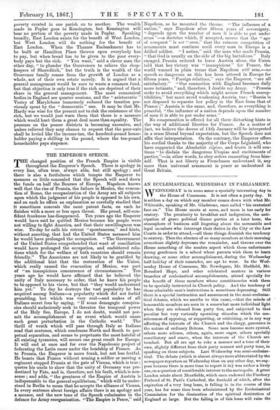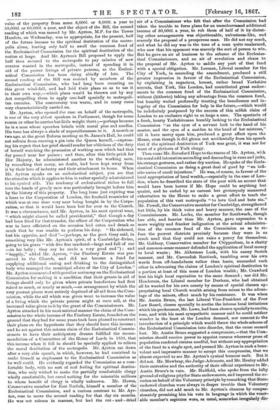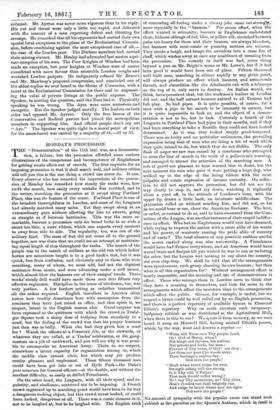AN ECCLESIASTICAL WEDNESDAY IN PARLIAMENT.
WEDNESDAY is in some sense a specially interesting day in the House of Commons. It is not often a party day. It is seldom a day on which any member comes down with what Mr. Whiteside, speaking of Mr. Gladstone, once called " his oratorical face on." The House meets at noon, and noon is too early for oratory. The proximity to breakfast and indigestion, the anti- cipation of grave political dinner parties at a later hour, the atmosphere of business still lingering about the mercantile and legal members who interrupt their duties in the City or the Law Courts in order to attend,—all these things diminish the tendency to oratory. Then the absence of so many members at their morning avocations slightly depresses the remainder, and throws over the House something of the sombre aspect which those unfortunate young gentlemen in a school whose parents wish them to learn drawing, or some other accomplishment, during the Wednesday half-holiday of their comrades, are apt to wear. In the Wed- nesday House of Commons, Mr. Newdegate, Mr. Hadfield, Mr. Beresford Hope, and other celebrated masters in various branches of ecclesiastical accomplishments, attend specially for the benefit of those members whose constituencies wish them to be specially instructed in Church policy. And the tendency of these admirable men's instructions is sometimes depressing. Still there is a special instruction and amusement in the semi-ecclesias- tical debates, which we ascribe to this cause,—that the minds of honourable members are seen in a somewhat more individual light when they are released from party ties, and subjected to that peculiar but very variously operating stimulus which the con- sciousness of opposing, or supporting, or criticizing, or in any way affecting the interests of the Church and the clergy, generates in the nature of ordinary Britons. Some men become more cynical, others more solemn, others, again, more eager, others specially conciliatory and suave, when the interests of the Church are touched. But all are apt to take a manner and a tone of their own, slightly different from their party manner and party tone, in speaking on these subjects. Last Wednesday was semi-ecclesias- tical. The debate (which is almost always more abbreviated by the newspaper reporters on Wednesday than on any other day, we sup- pose because there is more time to report it in) was rather a lively one, on a question of considerable interest to the metropolis. A great London estate about Moorfields, which once endowed the Finsbury Prebend of St. Paul's Cathedral, the freehold of which, after the expiration of a very long lease, is falling in in the course of this year, has for some time been administered by the Ecclesiastical Commission for the diminution of the spiritual destitution of England at large. But the falling in of this lease will raise the
value of the property from some 6,0001. or 8,0001. a year to 50,0001. or 60,0001. a year, and the object of the Bill, the second reading of which was moved by Mr. Ayrton, M.P. for the Tower Hamlets, on Wednesday, was to appropriate, for the present, half of the future income to the spiritual destitution of the metro- polis alone, leaving only half to swell the common fund of the Ecclesiastical Commission for the spiritual destitution of the nation at large. And Mr. Ayrton's Bill proposed to apply the half thus secured to the metropolis to pay salaries of new curates wanted in the metropolis, instead of spending it in aid of the poorer livings of private patrons, as the Ecclesi- astical Commission has been doing chiefly of late. The second reading of the Bill was resisted by members of the Ecclesiastical Commission, who had long been counting on this great wind-fall, and bad laid their plans so as to use it in their own way,—which plans would be thrown out by any Act compelling them to apply one-half specially to metropoli- tan curacies. The controversy was warm, and in many cases very characteristically carried on.
Mr. Ayrton, who opened the case on behalf of the metropolis, is one of the very ablest speakers in Parliament, though for some reason or other he carries but little weight there ;—perhaps because he is a man whose speeches bristle with moral pins and needles. His tone has always a shade of superciliousness in it. A month or two ago, at the great Reform meeting at St. James's Hall, he could not refrain from running a pin into the Queen herself,—express- ing his regret that her grief should render her oblivious of the duty of herself watching the procession of working men which had that day passed near her palace ; and then, after this little prick for Her Majesty, he administered another to the working men, by remarking that many, no doubt, had been kept away from it by their love of industry and their attachment to home. When Mr. Ayrton speaks on an ecclesiastical subject, you see that the stimulus which it applies to him is rather specially administered to his cynical side. The tendency of ecclesiastical riches to fall into the hands of greedy men was particularly brought before him by the history of this property. The long lease just expiring was a lease to the Corporation of London, the freehold remainder of which was at one time very near being bought in by the Corpo- ration, so that it would have been lost for ever to the Church. It was a circumstance, said Mr. Ayrton, in his most cynical tone, " which might almost be called providential," that though a day had been fixed for that transfer, the officer of the Corporation who was to have officiated on the occasion had eaten and drunk so much that he was unable to perform his duty. " He sickened, lost his appetite, and died "—(perhaps, as the poet Gray said, in something very like Mr. Ayrton's spirit, of a Cambridge divine, going to his grave "with five fine mackerel—large and full of roe —in his belly ; they say he made a very good end ") ; and " happily," added Mr. Ayrton, " the Finsbury Estate was pre- served to the Church, and did not become a fund for supplying additional eating and drinking to the distinguished body who managed the municipal affairs of the City of London." Mr. Ayrton commented with peculiar acrimony on the Ecclesiastical Commission for making it a condition that their grants in aid of livings should only be given where private benefactors had first raised as much, or nearly as much,—an arrangement by which the very poorest places were entirely deprived of all aid from the Com- mission, while the aid which was given went to increase the value of a living which the private patron might at once sell, at the increased value given to it by the grant of the Commissioners. Mr. Ayrton attacked in his most satirical manner the claim of the Com- mission to the whole income of the Finsbury Estate, founded on the ground that they had for some years back been pleased to construct their plans on the hypothesis that they should have this income ; and he set against this solemn claim of the Ecclesiastical Commis- sioners to have their anticipatory dreams fulfilled the recom- mendation of a Committee of the House of Lords in 1859, that this income when it fell in should be specially applied to relieve the moral destitution of the metropolis. Mr. Ayrton sat down after a very able speech, in which, however, he had contrived to make himself as unpleasant to the Ecclesiastical Commission as he well could. He evidently regarded the Commission as a com- fortable body, with no sort of real feeling for spiritual destitu- tion, who only wished to make the partially comfortable clergy wholly comfortable, but cared nothing for the miserable millions to whom benefit of clergy is wholly unknown. Mr. Howes, Conservative member for East Norfolk, himself a member of the Ecclesiastical Commission, and a curious contrast to Mr. Ayr- ton, rose to move the second reading for that day six months. He was not solemn in manner, but had the cut - and - dried
air of a Commissioner who felt that after the Commission had taken the trouble to form plans for an unembarrassed additional income of 60,000/. a year, to rob them of half of it by dictat- ing other arrangements was objectionable, unbusiness-like, and scarcely the proposal of a prosperous man. He did not say much, and what he did say was in the tone of a man quite unalarmed, who saw that his opponent was scarcely the sort of person to win. But he gave an air of business to the scheme of the Ecclesias- tical Commissioners, and an air of revolution and chaos to the proposal of Mr. Ayrton to saddle any part of that fund with a special obligation. Mr. Leeman,. Liberal member for the. City of York, in seconding the amendment, produced a still• greater impression in favour of the Ecclesiastical. Commission, by explaining in sagacious, honest, rather broad Yorkshire accents, that York, like London, had contributed great endow- ments to the common fund of the Ecclesiastical Commission, without (hitherto) taking any advantage from the common fund, but humbly waited profoundly trusting the beneficence and in tegrity of the Commission for help in the future,—which would be indefinitely postponed by the success of this selfish claim of London to an exclusive right to so large a sum. The spectacle of a fresh, hearty Yorkshireman humbly looking to the Ecclesiastical Commission "as the eyes of a servant look to the hand of his master, and the eyes of a maiden to the hand of her mistress," till it have mercy upon him, produced a great effect upon the House, even though it did gleam out accidentally from his speech, that if the spiritual destitution of York was great, it was not for want of a plethora of York clergy.
Then came Mr. Beresford Hope to the rescue of Mr. Ayrton, with his usual odd intonation ascending and descending in runs and jerks, his strange gestures, and rather dry unction. He spoke of the Eccle- siastical Commission as doing a great deal of good by "an infi- nite series of small injustices." He was, of course, in favour of the local appropriation of local wealth,—especially in the case of Lon- don, where he described the state of the poor with an accent that would have been horror if Mr. Hope could be anything but quaint, and he ended by an earnest but grotesquely mannered exhortation to the House to make a great effort to teach the population of this vast metropolis "to love God and hate sin." Mr. Powell, the Conservative member for Cambridge, strengthened but little, by his thick voice and heavy manner, the case of the Commissioners. Mr. Locke, the member for Southwark, though less able, and heavier than Mr. Ayrton, gave expression to a more weighty and franker indignation at the actual administra- tion of the common fund of the Commission so as to re- fuse the poorest districts precisely because they were in so much need that they could not raise a penny for themselves. Mr. Goldney, Conservative member for Chippenham, in a chatty and common-sense manner defended the application of local money. to local wants ; Mr. Alderman Lusk, with his canny Scotch manner, and Mr. Cavendish Bentinck, tumbling over his own words from off-handedness rather than haste, succeeded each other in advocating the claims of London's spiritual destitution to a portion at least of this mass of London wealth ; Mr. Crawford lent his high local reputation to the-same demand ; nor did Mr. Henderson, the Liberal member for Durham, who had obtained all he wanted for his own county by means of special clauses ap- propriating local Church wealth arising from mines to the advan- tage of the miners, effect much by his resistance. It was when Mr. Austin Bruce, the last Liberal Vice-President of the Poor Law Board, chosen specially to soothe the intense local irritations which his predecessor, Mr. Lowe, had been chosen specially to excite♦ rose, and with his most sympathetic manner said he could neither wonder in the least at the London demand, nor consent to the introduction of a principle which would throw the whole scheme of the Ecclesiastical Commission into disorder, that the cause seemed lost. Mr. Austin Brace suggested a compromise,—that the Com- mission should receive power to appoint curates wherever press of population rendered curates needful, but without any appropriation of the fund to a single spot, and pressed Mr. Ayrton in such a bene- volent and impressive manner to accept this compromise, that we almost expected to see Mr. Ayrton's cynical humour melt. But it did not. Mr. Mowbray, the Judge-Advocate, and Mr. Henley added their entreaties and the authority of their official experience to Mr. Austin Bruce's in vain. Mr. Hadfield, who spoke from the lofty ground of religious pityfor State endowments, and improved the oc- casion on behalf of the Voluntary principle byremarking that State- endowed churches were always in deeper trouble than Voluntary churches, did not add much to Mr. Ayrton's chances by compas- sionately promising him his vote in language in which the vener- able member's aspirates were, as usual, somewhat irregularly dis-
tribnted. Mr. Ayrton was never more vigorous than in his reply. His cut and thrust were only a little too rapid, and delivered with the manner of a man expecting defeat and thirsting for revenge. He remarked that all his opponents had carried their own special local exceptions to the plans of the Ecclesiastical Commis- sion, before combining against the most exceptional case of all, — the case of the London poor. The Durham members had carried their mining clauses. Mr. Henley had advocated last session a pri- vate exception of his own. The Poor Knights of Windsor had been made an exception, but poor knights at Windsor were of course considered with more favour than miserable London roughs and wretched London paupers. He indignantly refused Mr. Bruce's and Mr. Mowbray's proposed compromise, and concluded one of the ablest replies we ever heard in the House of Commons, with a taunt at the Ecclesiastical Commission for their zeal in augment- ing the value of private livings at the public expense. The Speaker, in putting the question, said the Noes had it. Physically speaking he was wrong. The Ayes were more numerous and energetic. But the Speaker judged morally. The leaders on both -sides had opposed Mr. Ayrton. Only the free lances of the Conservative and Radical parties had joined the metropolitan members in supporting him. And official people don't cry out " Aye." The Speaker was quite right in a moral point of view, for the amendment was carried by a majority of 34,-87 to 53.
































 Previous page
Previous page